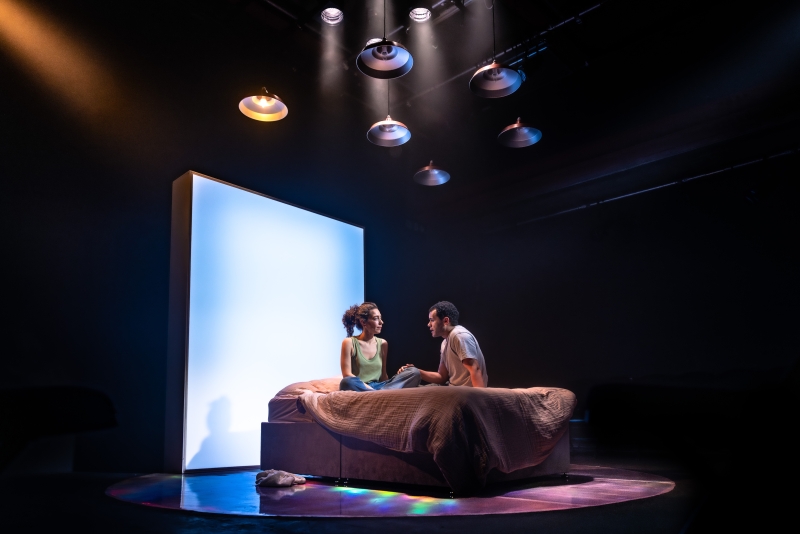Raw emotions in a play about loss
⭑⭑⭑⭑

Mark O’Halloran’s Conversations After Sex is about a woman throwing herself into 12 months of casual anonymous sex. Having won the Irish Times Best New Play Award, it is receiving its UK premiere at the Park90 Theatre. The intimate venue is ideal for watching such private conversations. The set is essentially a bed with a small amount of space around it, and the audience closing in on three sides.
There are something like twenty short scenes in which the character referred to as ‘She’ and played by Olivia Lindsay has just had casual sex and then chats with the man in question. Sometimes he is a returning lover, although even then they don’t know each other’s names; more often he’s a passing acquaintance. All are played by Julian Moore-Cook. There are occasional scenes, just as brief, between ‘She’ and her sister played by Jo Herbert.
It seems ‘She’ has engaged upon a series of one night stands after a traumatic event involving her partner, about which more is gradually revealed in the course of the play. The meaningless sex is a kind of self therapy, both a distraction and a way of moving on. I doubt it’s a form of therapy any counsellor would recommend but, over twelve months, she does reach some kind of understanding.
Despite the conversations being post-coital, they are rarely about sex. Nor do we see the sex that preceded them. We join them at the moment when the participants’ defences are down, thanks to both the anonymity of the liaison and the abandonment involved in sex. So, the men are inclined to be more honest than they might otherwise be, when they have an image to project and protect.
Julian Moore-Cook conveys the multiple male characters with great skill. Without the aid of costume changes, he goes from puppyish young man to emotional jilted boyfriend to self confident cheat. His face is a valuable tool that he manipulates through boyish smile to bewilderment to jutting pride.

The men tell tales of their adventures- one has had sex with half his neighbours, although he qualifies this by saying he lives in a cul-de-sac. They talk about their betrayals, like the one who gave his girlfriend chlamydia. They get upset about having been criticised. They rarely show self awareness as they reveal their self absorption. It is certainly an insight into the male psyche.
‘She’ seems glad of the company, and amuses herself (and us) with ironic comments. Some of her more serious remarks suggest she is looking for more than escape: ‘you remind me of someone,’ she says, as if these representatives of the male sex might offer a key to understanding her former lover.
Olivia Lindsay has a great way with an arched eyebrow and wry smile. Every so often, something triggers ‘She’ to remember her pain and her own emotions spill out. Again Ms Lindsay conveys these bursts of sadness with great feeling.
Revealing portraits & questionable nudity
I can’t say whether this is an accurate portrayal of the world of casual sex but, in the confined space of this play, these sad, amusing and occasionally angry encounters come across as believable. The dialogue and structure are well nigh perfect. Although much of the conversation is on the level of a chat, every so often the men, stripped of their defences, reveal grief over the death of parents or departure of lovers. What emerges clearly is that the real theme of the play is loss. Even the Sister is experiencing a loss.
Despite their tears, the men don’t impress us. This is partly because they seem peripheral, but also because they are portrayed as so narcissistic. By contrast, the ever present woman’s raw emotions as she navigates her grief touch your heart. The production is tightly directed by Jess Edwards, with splendid performances by all the cast.
But I have to question the use of nudity in this production. Nakedness on stage can be gratuitous, but in this case it is an important element of the story. The author’s intention in the script was that both main characters should start off naked. They soon get dressed, at least into their underwear, and remain so for the rest of the play, but I think this starting point is important because it symbolises the vulnerability of the characters in this situation, and reinforces why they are so honest about their thoughts and feelings. However, in this production, while Julian Moore-Cook is first seen completely naked, Olivia Lindsay is not.
I don’t know whose decision that was, and I’m not saying it ruined the production, but I do think it was a mistake, because the difference in the two characters’ first appearance created a misleading dynamic between them, suggesting only the man’s defences were down, which is far from the case.
Nevertheless Conversations After Sex is a fine piece of writing in a strong production and I would urge you to get to the Park Theatre and treat yourself to this little gem before it closes.
Conversations After Sex can be seen at the Park Theatre until 17 May 2025. Click here to buy tickets direct from the theatre.
Paul was given a review ticket by the venue.
Watch this review on the YouTube channel Theatre Reviews With Paul Seven